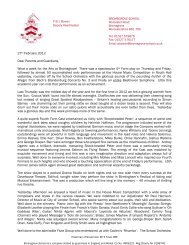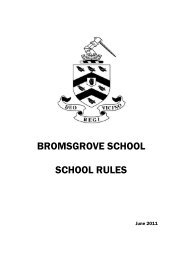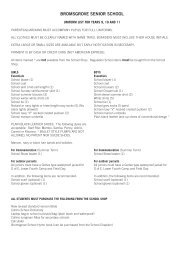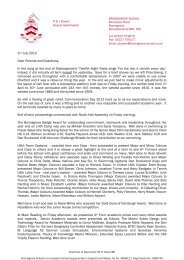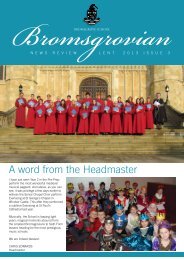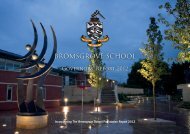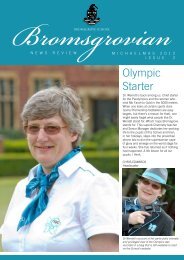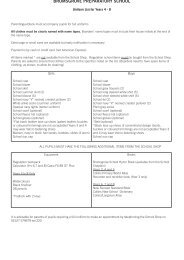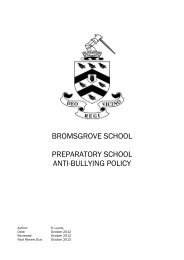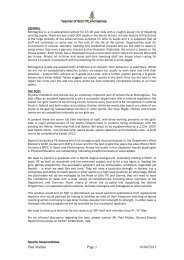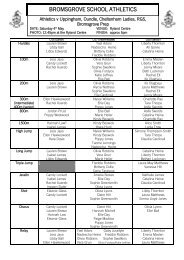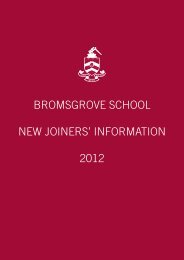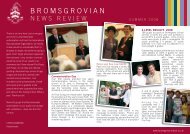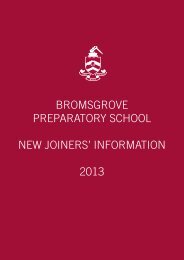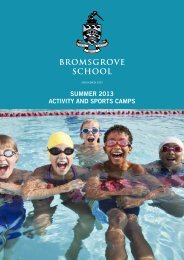Sixth Form Course Booklet 2013 - Bromsgrove School
Sixth Form Course Booklet 2013 - Bromsgrove School
Sixth Form Course Booklet 2013 - Bromsgrove School
Create successful ePaper yourself
Turn your PDF publications into a flip-book with our unique Google optimized e-Paper software.
PHYSICS<br />
WHY STUDY PHYSICS?<br />
The universe is a mysterious place. From the microscopic world of sub-atomic particles to the macroscopic world in<br />
which we live, and beyond, its complexity appears to stretch beyond the limits of any understanding. Yet here is<br />
physics, undefeated but respectful of this impossible puzzle, patiently through the centuries furthering its<br />
understanding. Maybe physics will never come close to understanding the universe in its entirety, maybe the more<br />
puzzles we solve the more questions we generate, but the road to understanding is both elegant and fruitful. Elegant in<br />
its rationale, in its patience to model all of what we see around us and all of what we do not; and fruitful in what it<br />
develops, for did not the study of physics, not by design but by pure thirst for understanding, yield the technology we<br />
take for granted today? Who would not want to study physics?<br />
AIMS OF THE COURSE<br />
To sustain and develop enjoyment of, and interest in, physics and to bring together knowledge of ways in which<br />
different areas of physics relate to each other. This is achieved through a broadly based subject content that is up-todate<br />
with examples of modern physics and its applications, to communicate the results clearly and logically.<br />
SKILLS NEEDED FOR AND DEVELOPED IN THE COURSE<br />
Many of the skills developed in GCSE Science, GCSE Additional Science and GCSE physics are enhanced further in AS<br />
and A2 physics. You will be able to understand the fundamentals of physics and you will have an awareness of physics<br />
in a wider context. In addition, you will be able to work independently and communicate effectively about topics you<br />
have studied. In practical work you will develop the ability to devise and plan safe experiments, and to communicate<br />
the results clearly and logically. In short, you will have commitment and interest.<br />
REQUIREMENTS FOR STARTING THE COURSE<br />
A minimum of a B grade in GCSE or IGCSE Mathematics and a minimum of either:<br />
Grade B in the physics component of GCSE Additional Science or IGCSE Double Award Science, or<br />
Grade B in GCSE or IGCSE physics.<br />
<strong>Course</strong> followed: Physics<br />
Examination Board: AQA<br />
CONTENT OF THE COURSE UNITS<br />
Unit 1<br />
Unit 2<br />
Unit 3<br />
Unit 4<br />
Unit 5<br />
Unit 6<br />
Particles, Quantum Phenomena and Electricity. (Particles and radiation. Electromagnetic radiation and<br />
quantum phenomena. Current electricity.)<br />
Mechanics, Materials and Waves. (Moments. Projectile Motion. Work, energy and power. Newton’s<br />
laws. Materials. Basic wave theory.)<br />
Experimental work. (Practical exercises are designed to develop practical skills, but they also require<br />
candidates to use their theoretical knowledge of physics and to apply it to a practical situation.)<br />
Fields and Further Mechanics. (Momentum. Circular motion. Oscillations. Work and Energy. Electric<br />
and Gravitational Fields. Magnetic fields. Capacitance.)<br />
Nuclear Physics, Thermal Physics and Astrophysics. (Radioactivity. Nuclear Energy. Thermal Physics.<br />
Lenses and Optical Telescopes. Non-optical Telescopes. Classification of Stars. Cosmology.)<br />
Experimental work. (Practical exercises are designed to develop practical skills, but they also require<br />
candidates to draw on knowledge, understanding and skills gained throughout their study of A level<br />
Physics and apply them to a particular experimental context.)<br />
METHODS OF ASSESSMENT<br />
AS: Unit 1: Written examination on Unit 1 (1¼ hours, contains short answer and structured questions)<br />
Unit 2: Written examination on Unit 2 (1¼ hours, contains short answer and structured questions)<br />
Unit 3: Practical examination (1 hour, internally assessed practical exam)<br />
A2: Unit 4: Written examination on Unit 4 (1¾ hours, contains multiple choice, short and structured questions)<br />
Unit 5: Written examination on Unit 5 (1¾ hours, contains short answer and structured questions)<br />
Unit 6: Practical examination (1 hour, internally assessed practical exam)<br />
82



